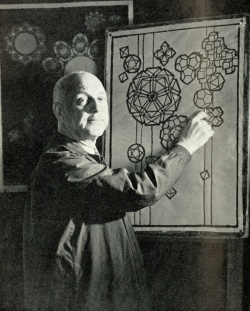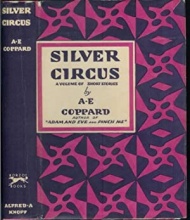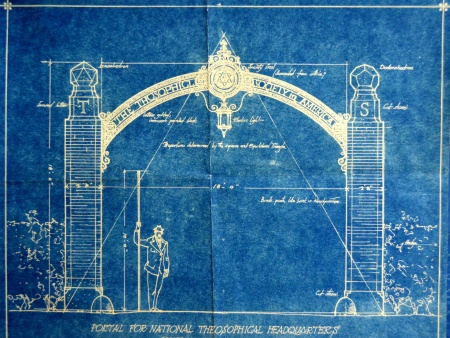Claude Fayette Bragdon
ARTICLE UNDER CONSTRUCTION
ARTICLE UNDER CONSTRUCTION
Claude Fayette Bragdon was an American architect, artist, writer, and publisher who was active in the Theosophical Society in America. He operated the Manas Press in Rochester, New York, and was the first publisher of P. D. Ouspensky's work, Tertium Organum. Dr. James Cousins referred to him as "Claude Bragdon of America to whom Architecture is Theosophy in stone."[1]
Early life and education
Architectural work
Design work
Book jackets
From the early days of his career, Bragdon designed "bindings for books" or book jackets, like these:
- At the Sign of the Sphinx: A Book of Charades by Carolyn Wells, New York: Stone and Kimball, 1896.[2]
- Stories from the Chap-book; Being a Miscellany of Curious and Interesting Tales, Histories, &c, a compilation by many authors. Chicago: Herbert S. Stone and Company, 1896. [3]
- The Will of Song; a Dramatic Service of Community singing by Percy Mackay. New York: Boni and Liveright, 1910.
- Dostoevsky by André Gide. New York : Alfred A. Knopf, 1926.
- Cora by Ruth Suckow. New York: Alfred A. Knopf, 1929.
- Silver Circus by A. E. Coppard. New York: Alfred A. Knopf, 1929.
Theatrical design
After giving up his architectural practice, Bragdon went to New York City, where he designed sets and costumes for Broadway plays.
Theosophical Society work
Influence on Olcott headquarters campus
In 1926, when the American Theosophical Society was planning its new national center in Wheaton, Illinois, Bragdon was asked to serve as architect. He was then reorienting his career from architecture to stage design, so he declined. He recommended engaging Pond, Pond, Martin & Lloyd, the Chicago architectural firm headed by his friend Irving Kane Pond, and the Society followed his advice. The architects submitted two designs for consideration, and the Society's Board of Directors was evenly divided over which should be the finalist. President L. W. Rogers sent both drawings to Bragdon, who sent back a telegram saying that his preference would be the "asymmetrical" design, and that is the one that was built.
Bragdon did design an important structure at the headquarters campus that was unveiled for members in a Co-Masonic dedication ceremony at the summer convention in 1940. An arch was built at the Main Street entrance to the campus. The cost of the project was underwritten anonymously by a member from Portland, Oregon, later acknowledged to be John H. Mason. Two stone and brick support columns are topped by carved Platonic solids – a dodecahedron and an icosahedron. Between them is a wrought iron arch with the name of the Theosophical Society in America and the TS emblem in the center. Originally a lighted lantern hung from the emblem, but it had to be removed in later years when vehicles became taller.
In 1942, then-President Sidney A. Cook wrote:
As I look out my office window a car stops at our gateway, as cars often do, while its occupants read the bronze plaques on its pillars, moving from the one to the other to read the whole of the statements they contain as to the founding, the Founders and the principles. The car passes on, but our Headquarters has made its impression; the breadth and dignity of our principles have sown seed. [7]
In 1989, the entire gateway had to be moved a few feet to accommodate a turn lane in Main Street, when an apartment complex was built across the street.
Writings
Bragdon frequently wrote articles for Theosophical magazines. The Union Index of Theosophical Periodicals lists over 90 titles by or about Bragdon. He also wrote excellent books about architecture, art, and Theosophy, listed here in alphabetical order. Most are compilations of essays or lecture transcriptions.
- The Arch Lectures: Eighteen Discourses on a Great Variety of Subjects Delivered in New York, During the winter of 1940'. New York, Creative Age Press, 1942.
- Architecture and Democracy. New York, A. A. Knopf, 1918. Available at Internet Archive, Hathitrust, Gutenberg.org, and other sources.
- The Beautiful Necessity: Seven Essays on Theosophy and Architecture. 1910. Rochester, NY: Manas Press. 109 p. Available at Internet Archive, Internet Archive, Hathitrust, Google Books, and Google Books.
- A Brief Life of Annie Besant, President of the Theosophical Society. Rochester, N.Y.: The Manas Press, 1909. 20 pages.
- Delphic Woman. New York, London, A.A. Knopf, 1936. Twelve essays reprinted from The New Image and Old Lamps for New.
- Details from Italian palaces. Rochester, N.Y.: Cutler Manufacturing Co., 1897.
- Episodes from an Unwritten History. Rochester, NY: Manas Press. In 1910, an enlarged second edition was published. Available at Internet Archive.
- The Eternal Poles. New York, A.A. Knopf, 1931.
- Explorations into the Fourth Dimension. Formerly Four Dimensional Vistas.
- Four Dimensional Vistas. New York: Alfred A. Knopf, 1916. Available at Internet Archive, Hathitrust, and Internet Archive.
- The Frozen Fountain. New York, A.A. Knopf, 1932. Available at Hathitrust.
- The Gift of Asia. Rochester, N.Y.: Manas Press, 1914. Available at Google Books and Hathitrust.
- The Golden Person of the Heart. Gouverneur, N.Y., Brothers of the Book, 1898. Available at Google Books and Hathitrust.
- The "Heathen" Invasion; an Open Letter to the Editor of the Hampton-Columbian Magazine. Rochester, N.Y.: Manas Press, 1911. 15 pages.
- The Home of the Rochester Chamber of Commerce at Rochester, New York. Boston: Rogers and Manson, 1918. A reprint from the Architectural Forum Dec. 1917.
- An Introduction to Yoga. New York, A.A. Knopf, 1933.
- Man the Square: a Higher Space Parable. Rochester, N.Y.: Manas Press, 1912. 34p. Available at Hathitrust and Google Books, both signed by author.
- "The Master of the Blue Cape" [story]. This inspired two members of the St. Petersburg Lodge to stage an impromptu play on December 21, 1938.[8]
- Merely Players. New York, A.A. Knopf, 1929. Essays continuing themes of "Old Lamps for New."
- The Message of Buddha. Rochester, N.Y.: Manas Press, 1914. 15 pages.
- Minor Italian Palaces. Rochester, N.Y.: Cutler Manufacturing Co., 1897. Portfolio, 6 plates.
- More Lives Than One. New York: A.A. Knopf, 1938. Available at Hathitrust.
- The New Image. New York: A.A. Knopf, 1928. Available at Hathitrust and Google Books.
- The New Rochester Chamber of Commerce Building. Rochester, NY: 1919. Available at Hathitrust and Google Books.
- Old Lamps for New, or The Ancient Wisdom in the Modern World. New York, A.A. Knopf, 1925.
- Oracle. Rochester, NY: Manas Press, 1921. 64 p. Portrait in frontispiece. Available at Internet Archive and Google Books. Bragdon collected messages that had been received by his deceased wife Eugenie Julier Macaulay Bragdon via automatic writing. Some are epigrammatic personal messages, and others are prophetic.
- A Primer of Higher Space (the Fourth Dimension). Rochester, NY: Manas Press, 1913. 78 p. Illustrated. Available at Internet Archive.
- Projective Ornament. Rochester NY: Manas Press, 1915. 78 p. Illustrated. Reprinted New York : A.A. Knopf, 1927.
- Revival: an Introduction to Yoga. 1933.
- The Secret Springs: an Autobiography. Rochester, N.Y.: Manas Press, 1917. Reprinted by New York: Cosimo Classics, 2005.
- Self Education: An Address Given Before the Boston Architectural Club April the third 1909. 1910. Rochester, NY: Manas Press. 16 p. Available at Internet Archive.
- Six Lectures on Architecture. Chicago: University of Chicago Press, 1917. Scammon Lectures. Coauthors were Ralph Adams Cram and Thomas Hastings. Available at Internet Archive, Hathitrust, Google Books, and other sources. Bragdon lectures included "Organic Architecture" and "The Language of Form."
- The Small Old Path. Rochester, NY: Manas Press, 1911. 2nd edition. available at Internet Archive, Internet Archive, Internet Archive, and Internet Archive.
- Theosophy and the Theosophical Society. Rochester, NY: Manas Press, 1909. Available at Internet Archive.
- Yoga for You. New York: Alfred A. Knopf, 1943.
Forewords, chapters, translations, and other contributions
- Brandon, Wilfred. Open the Door!. New York, A.A. Knopf, 1935. Introduction by Claude Bragdon. Available at Internet Archive and Open Library.
- Gargano, James W. Critical Essays on Henry James: the Late Novels. Boston, Mass. : G.K. Hall, 1987. Essay "The Golden Bowl: Thought as the Novelist's Sole Material" by Claude Bragdon.
- Mallgrave, Harry Francis. Architectural Theory. Oxford: Blackwell, 2007. Extract from Architecture and Democracy by Claude Bragdon.
- Mumford, Lewis. Roots of Contemporary American Architecture: a Series of Thirty-seven Essays Dating from the Mid-nineteenth Century to the Present. New York : Reinhold, 1952. Essay "The Language of Form" by Claude Bragdon.
- Ouspenskii, P. D. Tertium Organum: the Third Canon of Thought, a Key to the Enigmas of the World. Rochester, NY: Manas Press, 1920. Translated from the Russian by Nicholas Bessaraboff and Claude Bragdon ; with an introduction by Claude Bragdon. Available at Hathitrust, Google Books, and Hathitrust.
- Perrine, Van Dearing. Van Dearing Perrine, the Light Years: [exhibition] November 2-December 16, 1989. New York, N.Y.: Graham, 1989. Text by Claude Bragdon.
- Plummer, George Winslow. Consciously Creating Circumstances. West Hoathly [England] : Derricke Ridgway, 1953. Foreword by Claude Bragdon.
- Schmidt, Carl Frederick. Cobblestone Architecture. [Rochester, N.Y.], [Great lakes Press], 1944. Preface by Claude Bragdon.
- Society for the Study of Myth and Tradition. Triad. New York, N.Y.: Society for the Study of Myth and Tradition, 1989. Essay "An Architecture of Changeless Change" by Claude Bragdon. From Parabola, the magazine of myth and tradition,; v. 14, no. 4.
- Sullivan, Louis H. The Autobiography of an Idea. New York, Press of the American Institute of Architects, 1924. Reprinted New York: Dover Publications, Inc., 1956. Foreword by Claude Bragdon.
- Sullivan, Louis H. Kindergarten Chats on Architecture, Education and Democracy. [Lawrence? Kan.]: Scarab Fraternity Press, 1934. "First printed, in 1901, in fifty-two successive numbers of the Interstate architect and builder," per introduction. Edited and introduced by Claude F. Bragdon. Available at Hathitrust and Internet Archive.
- Uhlfelder, Eric. The Origins of Modern Architecture: Selected Essays from "Architectural Record." Mineola, N.Y. : Dover Publications, 1998. Essay "The New Architecture" by Claude Bragdon.
Additional resources
- Brown, Frank Chouteau. "Shakespeare, Hampden and Bragdon". The Drama. 11: March 1921: 197-199.
- Costa, Erville. "Claude F. Bragdon, Architect, Stage Designer, and Mystic." Rochester ' 29' October 1967: 1-20.
- Fuchs, Theodore. Stage Lighting. Boston: Little, Brown and Company, 1929; reprinted., New York: Benjamin Blom, Inc., 1957.
- Massey, Jonathan. Art and Involution: Claude Bragdon's Projective Ornament. Ph. D. dissertation; Princeton University; 2001.
- Massey, Jonathan. Crystal and Arabesque: Claude Bragdon, Ornament, and Modern Architecture. Pittsburgh: University of Pittsburgh Press, 2009. 336 pages. This is an excellent biography of Bragdon's life and work.
- Massey, Jonathan. "Organic Architecture and Direct Democracy: Claude Bragdon's Festivals of Song and Light". Journal of the Society of Architectural Historians. Chicago, Ill.: Society of Architectural Historians, 2006. 65.2006, 4, 578-613.
- Meyers, Carole. Wake Up and Dream!: Claude Bragdon's Idea of Theatre. Undergraduate dissertation, University of Rochester class of 1988. Department of English, University of Rochester, Rochester, NY, 1987.
- Oenslager, Donald. Stage Design, Four Centuries of Scenic Invention. New York: The Viking Press, 1975.
- Siegfried, David Allen. Claude Bragdon, Artist-in-the-Theatre. Ph. D. dissertation; University of Illinois at Urbana-Champaign; 1979.
Notes
- ↑ James H. Cousins, "The Life and Work of Jean Delville, Theosophist Painter-Poet." The Theosophist47.3 (December 1925), 396.
- ↑ See title page of book at Internet Archive.
- ↑ See title page of book at Internet Archive, and Internet Archive.
- ↑ Walter Hampden in "Cyrano de Bergerac". New York: Arthur Klar, 1936. Theater program. Costumes and sets designed by Claude Bragdon.
- ↑ Walter Hampden in "Caponsacchi" and "Hamlet". New York: Arthur Klar, 1900. Theater program. Costumes and sets designed by Claude Bragdon.
- ↑ Catalog of an exhibition of drawings and designs for Walter Hampden's dramatic productions by Claude Bragdon. Buffalo : Buffalo Fine Arts Academy, Albright Art Gallery, 1927.
- ↑ S.A.C.[Sidney A. Cook], "Our Gateway," The American Theosophist 30.3 (March, 1942), 70.
- ↑ Bulletin of the Florida Federation. January 15, 1939. From clipping in National Secretary's files for St. Petersburg Lodge. Theosophical Society in America.


